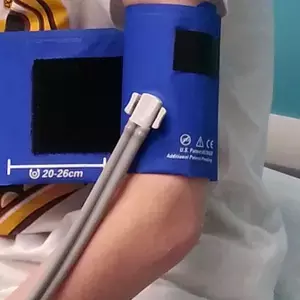- Home
- Medical news & Guidelines
- Anesthesiology
- Cardiology and CTVS
- Critical Care
- Dentistry
- Dermatology
- Diabetes and Endocrinology
- ENT
- Gastroenterology
- Medicine
- Nephrology
- Neurology
- Obstretics-Gynaecology
- Oncology
- Ophthalmology
- Orthopaedics
- Pediatrics-Neonatology
- Psychiatry
- Pulmonology
- Radiology
- Surgery
- Urology
- Laboratory Medicine
- Diet
- Nursing
- Paramedical
- Physiotherapy
- Health news
- Fact Check
- Bone Health Fact Check
- Brain Health Fact Check
- Cancer Related Fact Check
- Child Care Fact Check
- Dental and oral health fact check
- Diabetes and metabolic health fact check
- Diet and Nutrition Fact Check
- Eye and ENT Care Fact Check
- Fitness fact check
- Gut health fact check
- Heart health fact check
- Kidney health fact check
- Medical education fact check
- Men's health fact check
- Respiratory fact check
- Skin and hair care fact check
- Vaccine and Immunization fact check
- Women's health fact check
- AYUSH
- State News
- Andaman and Nicobar Islands
- Andhra Pradesh
- Arunachal Pradesh
- Assam
- Bihar
- Chandigarh
- Chattisgarh
- Dadra and Nagar Haveli
- Daman and Diu
- Delhi
- Goa
- Gujarat
- Haryana
- Himachal Pradesh
- Jammu & Kashmir
- Jharkhand
- Karnataka
- Kerala
- Ladakh
- Lakshadweep
- Madhya Pradesh
- Maharashtra
- Manipur
- Meghalaya
- Mizoram
- Nagaland
- Odisha
- Puducherry
- Punjab
- Rajasthan
- Sikkim
- Tamil Nadu
- Telangana
- Tripura
- Uttar Pradesh
- Uttrakhand
- West Bengal
- Medical Education
- Industry
Alpha blockers may be new treatment option for salt sensitive hypertension: Study

Boston - Researchers at Boston University School of Medicine (BUSM) have found in a new study that an alpha adrenoceptor blocker may represent a new treatment approach for patients with salt sensitive hypertension. This is the first study to demonstrate that α1-adrenoceptor antagonism reduces the activity of a mechanism in the kidney that reabsorbs salt to reduce blood pressure.
The findings of the study have been published in the journal Hypertension.
Increased sympathoexcitation and renal sodium retention during high salt intake are hallmarks of the salt sensitivity of blood pressure. The mechanism(s) by which excessive sympathetic nervous system release of norepinephrine influences renal sodium reabsorption is unclear.
High blood pressure affects one in two U.S. adults and can cause atherosclerosis which can lead to heart attacks, strokes or other complications including chronic kidney disease. Dietary salt intake can evoke salt-sensitive hypertension, which exists in approximately half of hypertensive patients.
The researchers used an experimental model that was fed a high salt diet (to model the content of a western diet) which led to an increase in their blood pressure. A portion of these models were then treated with an alpha 1 adrenoceptor blocker that reduced their blood pressure by decreasing the activity of a pathway in the kidney that reabsorbs salt. "Our data suggest blocking renal α1-adrenoceptors may represent a new treatment approach for patients with salt sensitive hypertension," said corresponding author Richard Wainford, PhD, associate professor of Pharmacology & Experimental Therapeutics at BUSM.
According to the researcher this study highlights the critical role of looking at the disease of hypertension in an integrated way by examining the interaction between multiple organ systems, in this case the sympathetic nervous system and kidney versus working in isolation. "We hope that these studies, that highlight a new mechanism underlying the salt sensitivity of blood pressure, will drive new treatment approaches for hypertension."
Hina Zahid Joined Medical Dialogue in 2017 with a passion to work as a Reporter. She coordinates with various national and international journals and association and covers all the stories related to Medical guidelines, Medical Journals, rare medical surgeries as well as all the updates in the medical field. Email: editorial@medicaldialogues.in. Contact no. 011-43720751
Dr Kamal Kant Kohli-MBBS, DTCD- a chest specialist with more than 30 years of practice and a flair for writing clinical articles, Dr Kamal Kant Kohli joined Medical Dialogues as a Chief Editor of Medical News. Besides writing articles, as an editor, he proofreads and verifies all the medical content published on Medical Dialogues including those coming from journals, studies,medical conferences,guidelines etc. Email: drkohli@medicaldialogues.in. Contact no. 011-43720751


